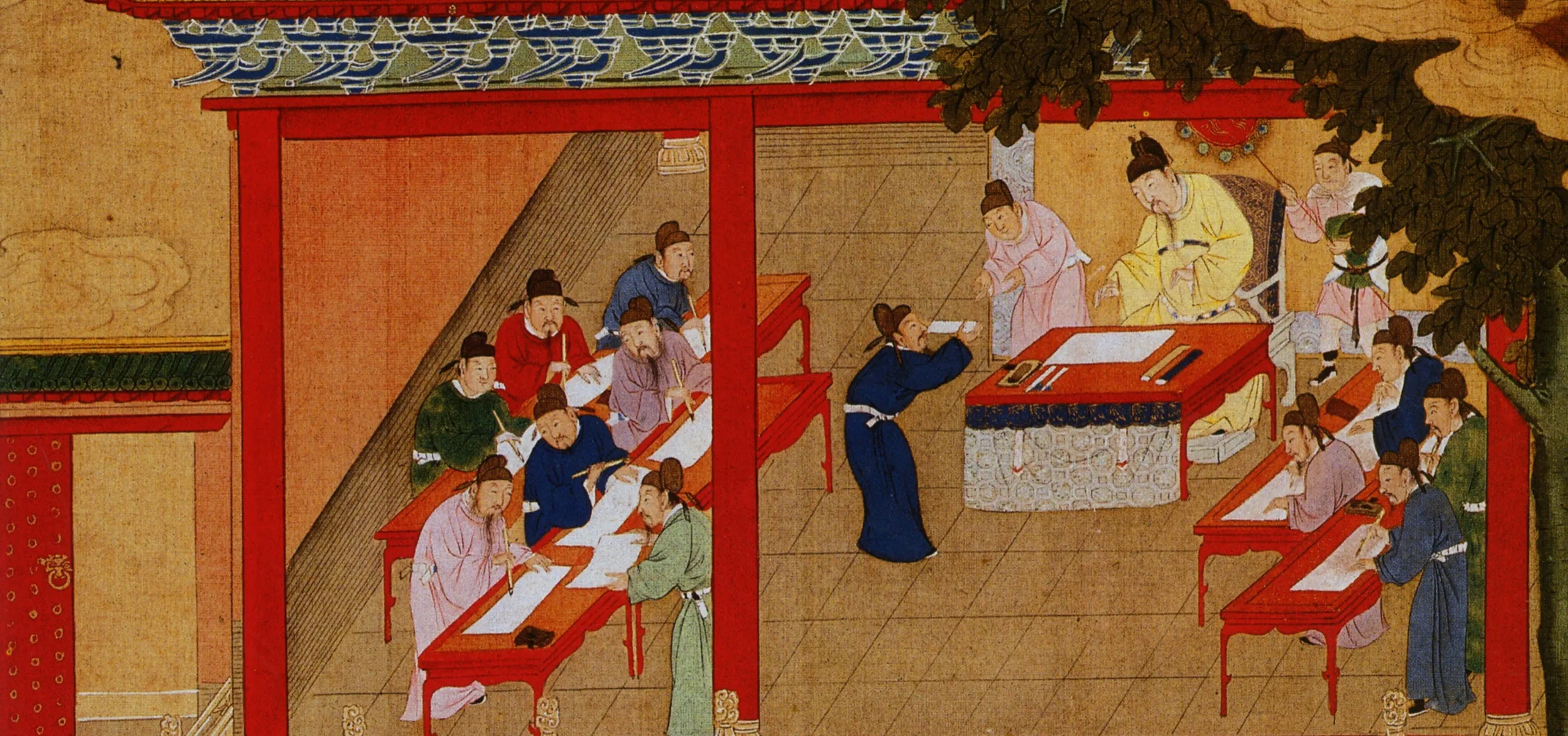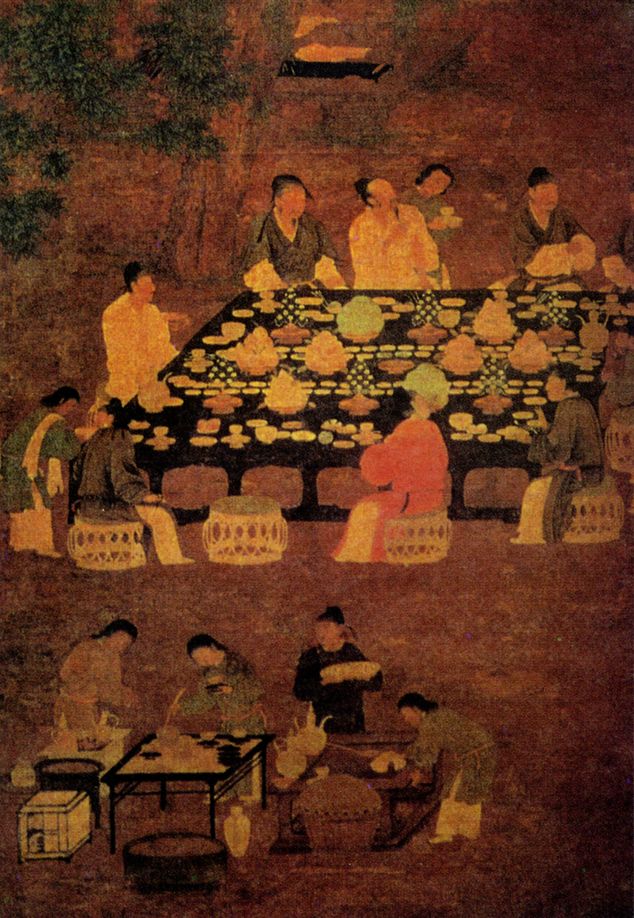In the Tang dynasty, scholars celebrated the end of exams with food, bribes, and cosying up to officials
Since the college entrance exams, or gaokao, finished last month, millions of Chinese high school students have been awaiting their results with trepidation. Whether their marks leave them disappointed or elated, however, tradition dictates that once the results are in, it’s time for a celebration.
Nowadays, students often attend a dinner, known as a “Graduation Banquet (升学宴)” or “Teacher Thanksgiving Banquet (谢师宴),” with schoolmates and teachers to celebrate and show thanks to those who helped with their studies. However, these gatherings have been called out by some officials as being hotbeds for extravagance and bribery, with “red packets (红包)” of money often passed around. One education bureau in Xingwen county, Sichuan province, even told citizens, especially Communist Party members and government employees, not to hold such banquets.
But the extravagance of meals today was nothing compared to how ancient students celebrated the end of their examinations: feasting, schmoozing officials, and even offers of marriage were common. Often, it was the government that organized these lavish proceedings for the graduating pupils. Here are some of the ways ancient Chinese celebrated post-exams:
The Deer Call Banquet (鹿鸣宴)
In the Tang dynasty (618 – 907), the imperial exam, or keju, consisted of two levels. The first was held by the county or prefectural government and known as 乡试 (provincial exam). People who passed the provincial exam were granted the title 举人 (jǔrén), and were qualified to take the higher exam, the 省试 (metropolitan examination), which was held by the Ministry of Rites in the capital.
Traditionally, after the provincial exam, local governments would hold a banquet for new juren, to reward their past efforts and encourage them to strive for further success.
According to the New Book of Tang (《新唐书》), an official history book finished in the Song dynasty (960 – 1279), the banquet was usually hosted by a high-ranking official, with scholars, local officials, and even celebrities invited. Pigs and sheep were sacrificed, orchestras played, and most importantly, the host and the guests would sing the “Deer Call (《鹿鸣》)” together.
“Deer Call” is a poem collected in Classic of Poetry (《诗经》), the oldest existing collection of Chinese poetry featuring poems and ballads from the 11th to 6th century BCE. The opening stanza reads: “The deer call to one other; eating grass in the field. I have admirable guests today; the lute and flute sound.” It was believed that the poem was originally sung by the emperor when he held feasts to entertain his ministers, as a display of the ruler’s respect for talented individuals. The Deer Call Banquet was therefore considered a gesture of respect from the government to the new juren.
That respect went further, however, with government officials or local nobility also seeking out scholars to sponsor, bringing them into their patronage networks. The Records of Siming (《四明续志》), a local chronicle from Ningbo, Zhejiang province, published in the Qing dynasty (1616 – 1911), recorded one Deer Call Banquet in Ningbo where every juren was granted 300 guan of coins (1 guan of coins could buy roughly 96 kilograms of rice).
Qujiang Banquet (曲江宴)
If a juren managed to pass the higher metropolitan examination, they could look forward to another round of banquets. One of these was the Qujiang Banquet, which was actually a series of feasts held at, and named after, a famous pool in the Tang capital Chang’an (present day Xi’an).
The first feast in a Qujiang Banquet was the “Hearing Good News Banquet (闻喜宴),” which was normally held the same day exam results emerged. According to the historical text Extensive Continuations to the Comprehensive Mirror in Aid of Governance (《续资治通鉴长编》), successful candidates would drink alcohol together at the banquet, and sometimes compose poems. Since most of these candidates would become colleagues in the future, the banquet was viewed as an important social opportunity to build networks.
Another important part of a Qujiang Banquet was the “Guan Banquet (关宴).” People who passed the metropolitan examination couldn’t become government officials directly, instead they needed to take another, much easier, exam held by the Ministry of Official Personnel Affairs, known as the “关试 (Entrance Examination).” The Guan Banquet was held after the entrance examination. Since successful candidates would soon be sent to different regions of the country to work, and might not see each other again for years, this banquet was also nicknamed the “Farewell Banquet (离宴).”
Many high-ranked officials and the nobles would show up at the Qujiang Banquets, especially those who had unmarried daughters. They would come to meet the young scholars, in the hope of marrying off their daughter to a suitable man.
Unlike the Deer Call Banquet where the government paid for the feast, the Qujiang Banquets were generally paid for by the scholars themselves, a considerable expense for those that came from poor family backgrounds.
According to the New Book of the South (《南部新书》), a collection of anecdotes from the Tang dynasty published in the Song dynasty, a candidate named He Shican (何士参) was once responsible for hosting the banquet and collecting money from the guests. Having collected what he could, He found the money still far short of the expense, and refused to start the feast until all the attendees had paid their dues. The guests made fun of him for his fastidiousness, and the event became known as the “Banquet of He Shican Claiming Debts (何士参索债宴).”
Luckily for the examinees, later in the Tang dynasty and the following Five Dynasties (907 – 960), the government began to sponsor all “Hearing Good News Banquets.”
Tail-Burning Banquet (烧尾宴)
Not all celebrations were large public affairs. When relatives and friends came to congratulate examinees on their success, the student would treat them to a private dinner, which was known as a “Tail-Burning Banquet” during the Tang dynasty.
Multiple folktales offer explanations for the name, all related to the change of identity and rank that the scholar enjoyed once they had passed their exams. One equates the meaning to the idea that when beasts transform into humans, their tails would remain unless burned off. Another version claims that when a sheep joins a new flock, it will only be accepted if it burns off its tail; while another references a legend whereby carp must jump over a waterfall named “Dragon’s Door (龙门)” to turn into dragons, but the fish must first burn their own tails off for the transformation to work. All three explanations indicated that the “burning tail” symbolized the change of one’s identity on passing the imperial examination.
Once the Xuanzong Emperor came to the throne in 712, however, the Tang court advocated frugality, and the custom of tail-burning banquets gradually died out—something the local authorities in today’s Xingwen county would surely have approved of.













